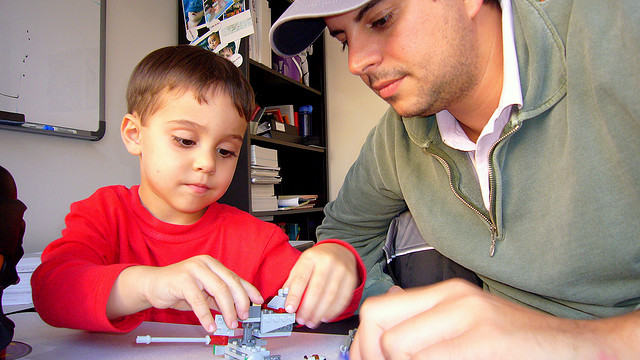Management Monday: Men and Women’s Work Life Balance Management Struggles…
Men and women face overwhelming cultural shifts in work expectations and home life responsibilities. Both genders desire to have successful career and family lives, but how do those two goals mesh with each other? Trends suggest they are still a long way from finding a happy marriage. One Pew Research Center report showed that men are dedicating more hours to helping at home and women have doubled hours of paid work since 1965. However, an American time use survey by the US Department of Labor showed that women are still doing nearly double the amount of house and family work than men. At the same time, the Pew Research Center report shows that paid work hours for men have barely dropped and according to NPR only 3.5% of stay-at-home parents are fathers.
While women are finding themselves caught up trying to balance double the housework and manage a career, many men are facing social pressures and unbending standards in their work environment. For example, the New York Times article The Unspoken Stigma of Workplace Flexibility mentions that men who are seeking to spend more time with their families are often seen as feminine. Unfortunately, studies show that at the end of the day, women are perpetuating the lack of balance and men have little guilt over the whole discussion. Meanwhile, men, women and society may not be taking the correct approaches in changing the trajectory of these issues. This needs to change.
The Guilty Party: Men and Women
The Solution: Men Need to Care More and Women Need to Care Less
1) Women say they would like to spend more time with family. Why is this a stumbling block? Well, it’s obviously good to want to spend more time with family. But statistics do show that working women speak more passionately about family life than men (HBR). It would seem logical to admit that this might enable men to feel less responsible for household and family issues.
2) Women often embrace a sense of identity as overworked and a supermom balancing it all and then dwell on struggles. Articles and blog posts are filled with accounts from many mothers of their “doing it all” bind. Simply put by Henry Ford, “If you think you can or think you can’t, you are probably right.” This isn’t to say women are masquerading as overworked and then it becomes real. More accurately, the more women focus on negatives, the less time they can spend overcoming the problem.
3) Mothers desire to advance their careers, but still see themselves as the leader in household responsibilities. As a result they expect to be overworked and overwhelmed. In Ender’s Game, Orson Scott Card wrote “Perhaps it is impossible to wear an identity without becoming what you pretend to be.” In other words, perhaps mothers often set out with a skewed mindset and expectation. This mindset also often prevents spouses from offering needed help, because women don’t ask or they refuse help because they feel a need to do it all.
4) Fathers conform to the “breadwinner” standard that’s still very popular, but worse, they feel no guilt in having their wife shoulder all household responsibilities. This is highlighted in a study of executive fathers (Slate).
5) Fathers desire to help more at home, but most don’t embrace a sense of responsibility. They still look to the female as the lead in the household department.
6) Men and women find role reversal and attaining balance very stressful (NPR Survey), but they often don’t seek work life balance guidance.
7) Mothers, fathers and other authoritative figures are still encouraging gender bias in children. They may discourage a boy from playing with dolls or cooking. This leads to perceived gender roles, which combats efforts toward shared opportunity and balance for current and future generations (NPR).
No one is blameless in this circus. Each side is enabling the other to continue in unhealthy cycles. At the end of the day, each family must carve out for themselves the right answers. But universally it seems obvious that women are overly stressed and concerned about these issues across the board, while men are facing similar pressures, but face less guilt and feel less motivated to change. While the list above highlights where men and women need to improve and create positive change, there are plenty of strides already happening in the correct direction. Celebrities like Tim McGraw have spoken about the importance of finding time for family and creating balance (People). Understanding the obstacles listed above should help empower women to realize they shouldn’t have to do it all and men to realize they need to step up more. Every situation is unique and each family must carve out their own perfect balance. Based on statistics, in most cases, women would do well to lower their expectations of themselves. Both men and women would also do well to talk openly with their spouses. Finally, men can step up more to share responsibility.
Photo Credit: Carvalho
Related Reads:
Career Couple Ego Slam
Work Life Balance Elephant Theory
Work Life Balance Training
Work Life Balance Challenges for Men
This Blog has been featured by the West Orange Chamber of Commerce. Sources such as HLN have also been home to publications by Dr. Farnaz Namin-Hedayati and she has been cited by the Orlando Business Journal.
Center for Work Life of Orlando, Florida is an award-winning executive development firm providing leadership and management training to executives and organizations. Our main services include executive coaching, leadership development, executive succession planning, emotional intelligence training, career planning, staff development, and communication in the workplace.






